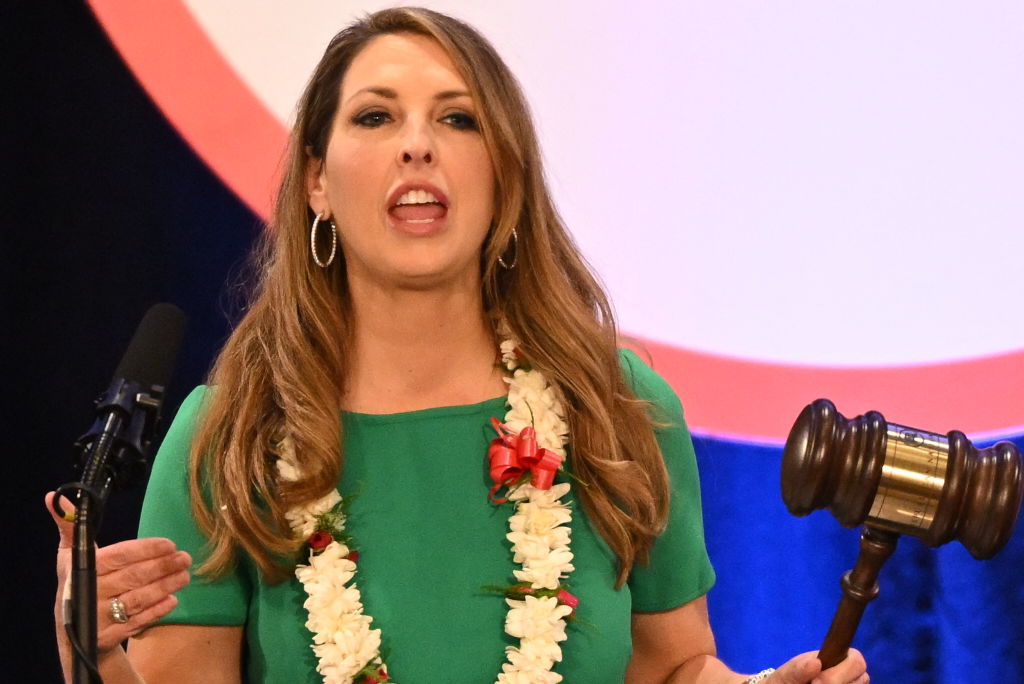Congratulations to Ronna “Mitt Who?” McDaniel on being chosen to lead the Republican National Committee for a fourth consecutive term, the first person to do so in more than a century.
Or: Congratulations to attorney Harmeet Dhillon on upsetting McDaniel in her longshot bid to become chairman of the Republican National Committee.
The congratulations are conditional because, as I write these words on Friday morning, the committee has yet to vote. Its 168 members will cast their ballots early this afternoon with McDaniel favored to hang on, having already received endorsements from a majority of the RNC in November. But Dhillon claims there’s been movement her way at the eleventh hour after she landed a major surprise endorsement. As the committee convenes, there’s a whiff of suspense in the air.
I could wait around and write about the result, but why bother? Substantively, it hardly matters.
(Fine. For the record, McDaniel won.)
“No one is sure what the RNC does anymore or even if it’s needed,” Daily Caller columnist Peter Roff observed recently. “The rise of the Internet as a political tool, the Supreme Court decision in Citizens United, and the adoption of personality politics in both parties as an avenue to winning elections [are] rendering the organization obsolete.” Dhillon has detailed her grievances with McDaniel’s leadership in an op-ed but no one expected a sea change in how the RNC operated if she were elected. And certainly no one expects a sea change in Republican electoral fortunes based on what’s happening at the RNC.
Take this passage from Dhillon’s manifesto, for instance. “When Democrats are voting for a month and Republicans for a day, we’ve lost before we even get warmed up,” she writes. “Until election month gets tightened up to a short period of early voting, we must compete and outperform Democrats in early voting, including competing for independent voters before the opposition gets to them.”
It’s good advice, but it ain’t Ronna McDaniel who’s been discouraging Republicans from voting early. We all know where the blame for that lies.
That’s the problem with the McDaniel/Dhillon squabble in a nutshell. The GOP’s electoral fortunes during McDaniel’s tenure have been dismal, undeniably: Democrats regained the House in 2018, the presidency in 2020, and outperformed all expectations in the 2022 midterms. It’s understandable that Republicans would clamor to oust the leader responsible for so many failures.
But, again, Ronna McDaniel ain’t that leader.
It wasn’t McDaniel who threw her weight behind nominating cranks in Republican primaries. And when those cranks were foisted upon her, she did what she could to steer money their way. Which is more than can be said for some people.
The effort to oust her from the RNC is little more than an effort to shift blame away from Trump for the GOP’s recent electoral disasters and onto a scapegoat from the Republican establishment. It’s like firing a manager in baseball for having a losing record after the owner saddled him with a bunch of no-talent players. You can’t fire the owner, especially one beloved by the “fans.” So, to signal your awareness that something needs to change, you boot the manager instead.
For that reason alone, I’m glad McDaniel won. It amounts to a statement by the RNC that they know where the blame for Republican underperformance lies and it’s not with their chairman.
Despite its low stakes, though, the RNC election was interesting for two reasons. One is that it was something of a proxy fight for 2024. The other is that it demonstrated vividly how confusing it’s become to decide who “the establishment” in Republican politics is.
Let’s talk about that last-minute major surprise endorsement that Dhillon received on Thursday—which, for whatever reason, she claims isn’t an endorsement. It’s a doozy.
DeSantis’ game couldn’t be clearer. Trump is formally neutral in the RNC race, insisting that he likes both candidates, but there’s no way to disentangle him from McDaniel. She took over the RNC at the start of his presidency and enjoyed his support for six years. Under her leadership, the committee showed slavish loyalty to him by paying his legal bills and reducing its national platform in 2020 to “whatever Trump wants.”
The infamous press conference in November 2020 at which Sidney Powell and Rudy Giuliani ignited the “Stop the Steal” conspiracy theory was held at the headquarters of Ronna McDaniel’s RNC. McDaniel said later that she regretted it, but to this day you can find video of that presser on the official RNC Twitter account.
McDaniel is the Trump proxy in the race. And so here was Ron DeSantis strategically backing Harmeet Dhillon.
It was a no-lose proposition for him. Had Dhillon won, DeSantis would have been credited for her victory. It would have served notice to Trump that Republican movers and shakers are trending his way. But Dhillon losing was okay for him too since the race allowed him to align himself with populist influencers against a Trump loyalist in the person of McDaniel. Fox News primetime had been backing Dhillon; so had various Republican state parties who issued statements of “no confidence” in McDaniel; and on Wednesday Kari Lake showed up to lobby RNC members on Dhillon’s behalf. It stands to reason that the GOP grassroots would reflexively oppose a figure like McDaniel who represents entrenched power at the ultimate establishment institution, particularly if they’re hunting around for a scapegoat to let Trump off the hook for the midterms.
In case there’s any doubt whom the populist choice was, McDaniel supporters on the committee reported being deluged with “moronic, sad, pathetic” emails on Dhillon’s behalf, some of them “threatening—mean-spirited.” In the Trump era, the surest sign that MAGA is engaged on one side of an issue is that threats are flying at the other.
For DeSantis, you can’t go wrong seizing an opportunity to take the base’s side against Trump in a proxy fight. His 2024 strategy is to drive a wedge between the MAGA cult and its leader by accusing Trump of having sold out the right on pandemic restrictions and vaccines. The McDaniel/Dhillon contest was one more box for DeSantis to check to show Republican primary voters that he represents their interests nowadays better than Trump does.
And of course, by highlighting McDaniel’s electoral failures, he implicitly highlighted Trump’s. He doesn’t have the juice yet to accuse Trump directly of being unelectable (although it’s interesting that he framed the outcome in 2020 as a disappointment rather than a product of Democratic chicanery in the clip above) so instead he did so indirectly by accusing Trump’s longtime RNC chief of having driven the party into a ditch. When he said that the GOP needs “new blood,” it was plain as day who he’s talking about. And again, it ain’t Ronna McDaniel.
Wait a sec, though.
How can populists treat McDaniel as a proxy for the Republican establishment while DeSantis treats her as a proxy for Trump? Trump is the nemesis of the Republican establishment. He hates Paul Ryan and Mitch McConnell; he’s implied repeatedly that John McCain is in hell; he beat George W. Bush’s brother in the 2016 primary and recently drove Dick Cheney’s daughter from Congress. He’s attacked Mitt Romney more times than I can count.
How can his loyal servant, Ronna McDaniel, be “the swamp’s” choice?
The fascinating thing about the RNC election was how it blurred the traditional lines between populism and establishmentarianism. And it’s not the only intraparty squabble lately to have done that.
Like Ronna McDaniel, Kevin McCarthy struggled to win a contest for a job no sane human would want and whose purpose is increasingly unclear. And like McDaniel, he prevailed by fashioning a political identity for himself that’s certainly not populist but no longer distinctly establishment either.
McCarthy and McDaniel each worked for years in Republican politics before Trump splashed down in 2015. They’re relics of the pre-Trump GOP, in other words, and therefore will always remain suspicious to populists. (McDaniel is Mitt Romney’s niece, for cripes sake.) But the two managed to climb to the pinnacle of their party by following the same strategy, accommodating themselves to Donald Trump’s whims in return for his favor. They craved status and were willing to cuddle up to a civic menace to get it.
Is a traditional Republican who resolves to serve a deranged authoritarian more properly thought of as a populist or an establishmentarian? No one would mistake Kevin McCarthy for a true-believing culture warrior but he wooed Marjorie Taylor Greene and Thomas Massie in his fight for speaker and ended up surrendering to populists like Chip Roy on nearly every procedural concession they demanded. He may yet end up orchestrating a default on the sovereign debt of the United States simply because that’s what nihilist grassroots Republicans desire.
What do we call an establishmentarian who operates as a handmaiden to populism, however reluctantly? More to the point, shouldn’t true-blue populists be satisfied with having someone like that as a leader? McCarthy might not be “one of us” culturally, but if he’s willing to do Trump’s and the base’s bidding, he’s as useful as an authentic populist would be. Maybe more useful, in fact, since he can lend a patina of sane mainstream Republicanism to populist demands in a way that figures like Greene and Massie can’t.
Ronna McDaniel is in the same category. She’s a Trump ally opportunistically, not out of conviction, but an opportunistic ally is an ally all the same. Is someone who “codes” as a Romney Republican but who functions reliably like a Trump Republican more properly thought of as a populist or an establishmentarian?
To grasp how confounding that question is, chew on this fact: Harmeet Dhillon presented herself to RNC members as the candidate for Trumpers and Never Trumpers.
According to Politico, Dhillon’s team “sought to make the case that McDaniel’s connections to the former president, who hand-picked her as chair after his 2016 victory, will prevent her from being completely neutral in an upcoming presidential primary, a criticism McDaniel has publicly rejected.” One committee member marveled that anti-Trumpers within the RNC were divided between the two candidates, unable to discern which would be less likely to do Trump’s bidding. “It’s just the weirdest thing I’ve ever seen,” he told the paper.
Bear in mind that Harmeet Dhillon isn’t any ol’ lawyer. She’s Donald Trump’s lawyer. He hired her firm to battle the January 6 committee when it sought to subpoena him. She also served as a legal advisor to Trump after the 2020 election, saying at one point that she hoped Amy Coney Barrett and the other Trump appointees on the Supreme Court would “step in and do something” and ultimately “come through” for him. Which made it sound like she expected Barrett et al. to behave like Trump-loyalist hacks, the law be damned.
McDaniel is so jungled up with Trump after six years, in other words, that some Never Trump RNC members think his own attorney is a better bet to say no to him as RNC chair when he demands something unreasonable.
Bill Palatucci, an RNC committeeman from New Jersey who is supporting Dhillon, said the RNC under McDaniel “owns lots of blame for failing to win back the Senate.”
He cited GOP candidate quality as a top issue for the party in the midterms, and said Dhillon agreed with him that the RNC has to be more “involved in putting forward good candidates so we avoid poorly prepared people like Herschel Walker and Doug Mastriano.”
…
“A strong leader would speak up, and Ronna just sat idly by as Trump endorsed loser after loser,” he texted CBS News during his flight to California for the RNC meeting.
“We have heard many RNC members grumble over the past two days that they want a fresh face to lead the party — and someone better positioned than McDaniel to beat back Mar-a-Lago fever and ensure the org’s neutrality in the 2024 primaries,” Politico reported on Friday morning before the vote. Dhillon had allegedly taken to “privately telling members concerned about the diehard MAGA posse around her that she is not an election denier and will do more than McDaniel to push back on Trump when needed.”
Did I mention that the person saying that is Trump’s lawyer?
It gets weirder. This week the New York Times surveyed the committee’s members to gauge how enthusiastic they are about a third Trump campaign. Answer: Not very. Just four out of 168 contacted by the paper said he should be the party’s nominee again in 2024. By comparison, 20 said he shouldn’t be and another 35 either said they were looking forward to a contested primary or declined to take a position. Some told the Times they estimated that between 120 and 140 of the group’s 168 members oppose nominating Trump again. “We can’t be a cult of personality any longer,” one of them put it.
Then they turned around and reelected someone who served Trump loyally for six years as RNC chief.
Look at it this way. If you were rooting for the “change candidate” in the McDaniel/Dhillon race, who were you rooting for? McDaniel was the candidate of the status quo insofar as she’s been in charge since 2017; if you believe change in the party needs to start at the RNC, Dhillon was your choice. But if you believe change needs to start at the top, with Trump and Trumpism, then arguably McDaniel is a better bet for change. Dhillon, the true populist, seems more likely to put a thumb on the scale as RNC chair for a hard-right candidate in 2024 than a member of the Romney family who worked on the Mitt 2012 campaign.
You see now, hopefully, why this is the weirdest dynamic RNC members have ever seen.
I’ve written before that the GOP is two parties masquerading as one. Post-liberal populists and classically liberal conservatives have locked arms, uncomfortably, to win power from the left. If you aim to be a leader in a chimerical party like that, you need to be a bit of a chimera yourself.
That’s how we ended up with Romneyesque Glenn Youngkin campaigning for conspiratorial boor Kari Lake before the midterms. Youngkin lent Lake some normie appeal by doing so, Lake lent Youngkin populist cred by association. If you want to climb the ladder in the Trump-era GOP, you need a foot in both camps. Kevin McCarthy and Ronna McDaniel understand that better than most.
The great disappointment of the midterms applied further pressure toward chimerical leadership. Had Trump’s MAGA menagerie won their statewide races, the GOP would have doubled down on populism as an electoral path forward. Instead the talismanic words “candidate quality” have been uttered repeatedly since November as code for preferring more centrist mainstream nominees in 2024. The party can’t win by going all-in on populism. At the very least, à la McCarthy and McDaniel, it needs to seem normal while serving abnormal people.
And just to muddy the waters a bit more, there’s the unhappy reality that after eight years of dominating the party, Donald Trump is to all intents and purposes the Republican establishment. George W. Bush served two terms as president yet never enjoyed the degree of influence over the party that a twice-impeached, once-defeated Trump does. Viewed that way, it’s not so much of a contradiction for DeSantis to treat Trump’s RNC chief, McDaniel, as a vestige of a failed Republican establishment. Trump is the establishment. He failed. And only by nominating a different candidate, a true populist, can the party avoid failure again in 2024—or so the forthcoming DeSantis campaign will claim. We’ll hear much more about it by summer, assuming Team Ron has the stones to make the case forthrightly.








Please note that we at The Dispatch hold ourselves, our work, and our commenters to a higher standard than other places on the internet. We welcome comments that foster genuine debate or discussion—including comments critical of us or our work—but responses that include ad hominem attacks on fellow Dispatch members or are intended to stoke fear and anger may be moderated.
With your membership, you only have the ability to comment on The Morning Dispatch articles. Consider upgrading to join the conversation everywhere.